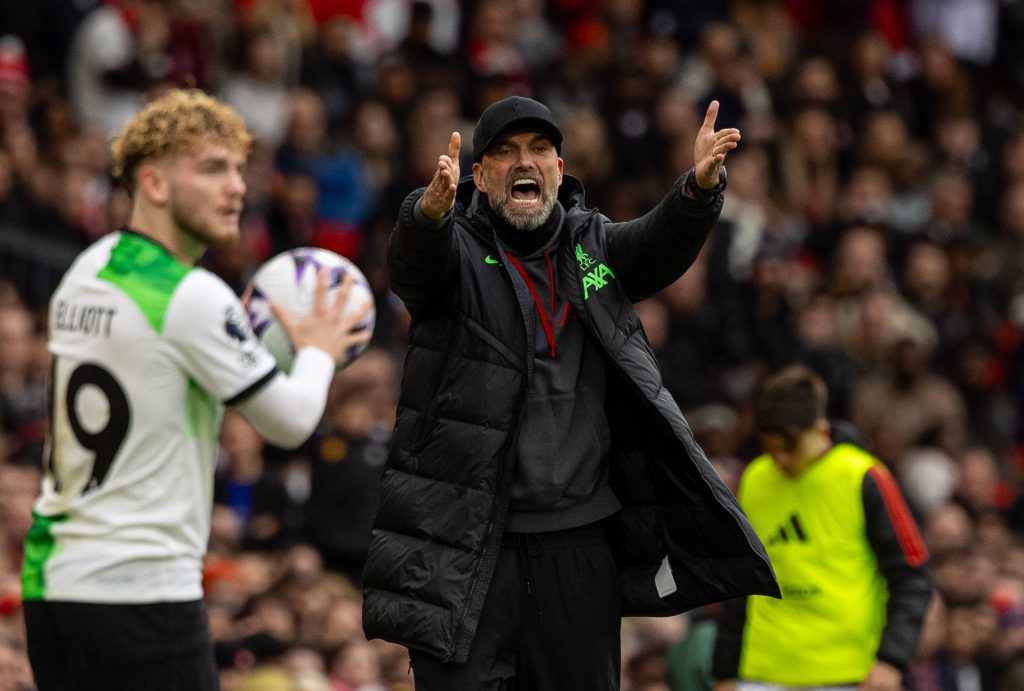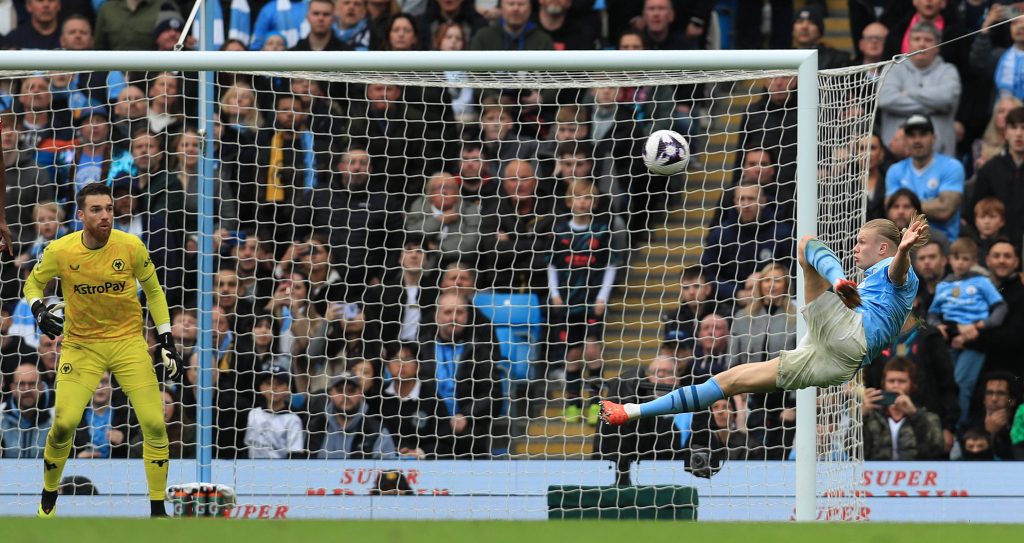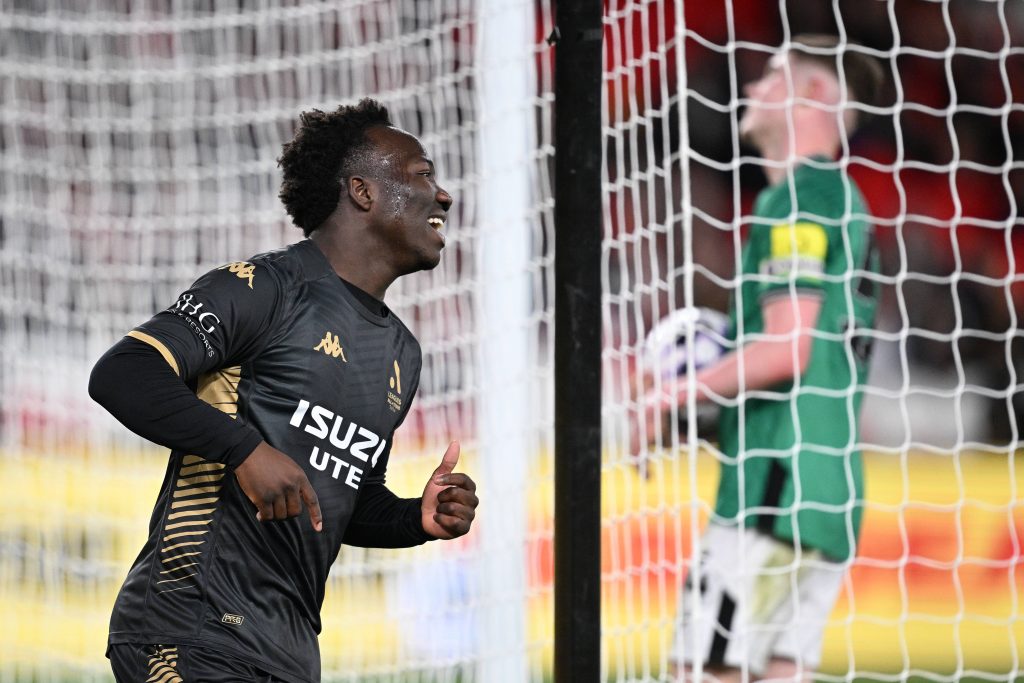Domestic form is a good predictor of international form for most players, but players like Harry Maguire seem to particularly suit international football. Eduin Latimer investigates
Going into the 2022 World Cup, Harry Maguire posed a problem for Gareth Southgate, the England football manager. At last year’s European Championships he was one of England’s better players. He anchored the defence and was good in the air. He won 21 aerial duels, the second most in the tournament. He also scored from a corner and confidently put his penalty away in the penalty shootout.
However, since last summer Maguire’s club performances have been substandard. Fans ranked his performance 2 out of 10, when Manchester United lost 4-0 to Brentford. He has since been out of favour and has only started three of 14 games this season.
Many international managers face similar problems to Southgate’s Maguire problem. Do you stick with someone who has performed for you before? Or do you drop a player who is underperforming for their club?
Domestic league performance is a good predictor of international performance for most players
I explored this question using data on 85 outfield players, who played more than 150 minutes at either Euro 2020 or Copa America 2020. On a range of key metrics, I tested whether their recent club performance or recent international performance better predicted their performance at the tournaments.
The graph below summarises the results. It shows how much of the variation between players on a given metric (for instance, expected goals) at the UEFA European Championship and the CONMEBOL Copa América can be explained using different information. If the score is 100, this means that you can perfectly predict performance on that metric using the given information, if it is 0 it means your predictions are basically useless.
For each metric, I use three sets of information: firstly, the performance of each player on a given metric in previous internationals between 2018 and 2020; secondly, the performance of each player on the same metric in their domestic league (club football) for 2020; and finally, I allow the model to combine the two bits of information (the model is a simple linear regression and the x value here is the R squared of that regression.)

Two main points can be taken from the results. For most, but not all, metrics, domestic league performance can explain more of the variation in tournament performance than previous internationals. This suggests that managers should put more weight on domestic league performance than previous international performance. You can see this in the two plots below. They show that the relationship between domestic league performance and future tournament performance cluster more tightly together around the trend relationship. Whereas for comparison of previous international performance and tournament performance, there is more noise around the relationship.
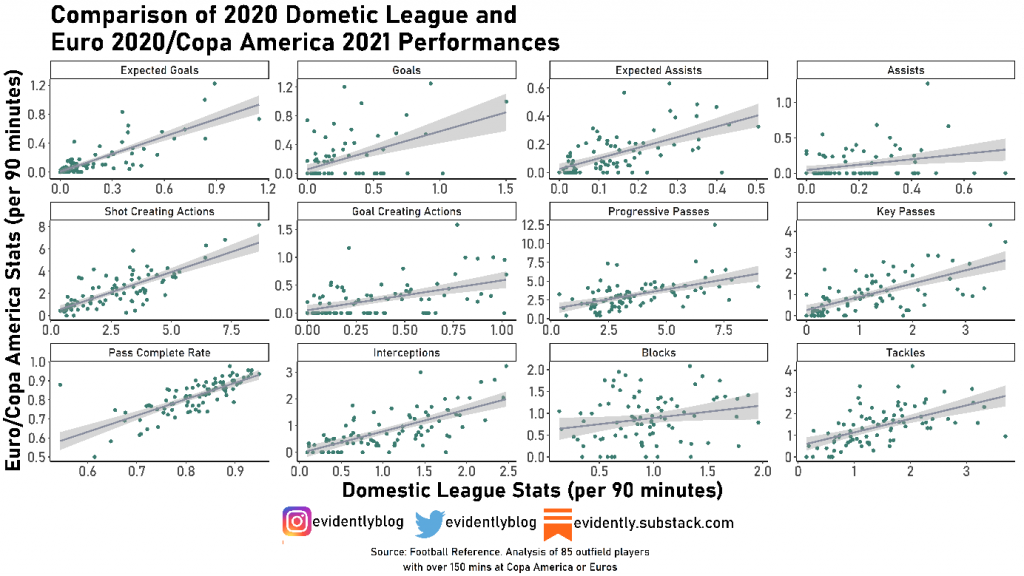
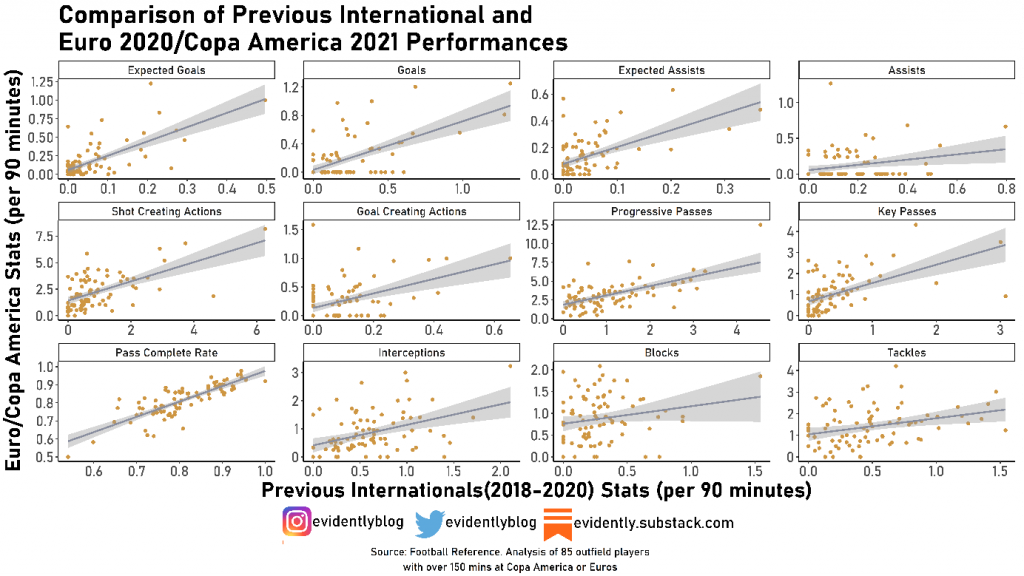
This makes sense. Players typically play more minutes in a domestic season than in international competitions, so their domestic statistics are less likely to be affected by a few fluke performances. Domestic competition is also more recent and more clustered, so is likely to be a more up-to-date account of that player’s ability.
The second point to make is that for most metrics the best prediction uses a combination of both pieces of information. While domestic league performance is on-balance the more useful metric, previous international performance is also useful. Some players suit their international team’s style better than their domestic team’s. A sensible international manager will weigh up both pieces of information, as well as information we can’t see such as training performances, or effect on team cohesion, when picking their squad and starting team.
Why do some players perform better in internationals? The case of Harry Maguire
Gareth Southgate leaned on his experience of international football and has picked Maguire, despite his poor domestic form. Three games through the World Cup, Southgate has been rewarded by some impressive Maguire performances. Maguire has been solid defensively and has contributed through attacking set pieces. So why has Maguire continued to perform well internationally, despite poor domestic form?

One factor is his relationships with his team-mates and his manager. There has been a lot of disruption and unrest at Manchester United in the last three years. Maguire is still the club captain but has been dropped from the first team and high-profile [former, now] team-mates have apparently called for him to lose the captaincy. In comparison, Southgate has always spoken positively about Maguire and recently said “We have complete belief in him.” Maguire has also built a stable partnership with John Stones in central defence. This suggests part of Maguire’s improved international form is related to confidence and happiness.
Tactics also play a role. Southgate has used Maguire in a role he is comfortable in and that plays to his strengths. In contrast both the current and former Manchester United managers have instituted an aggressive pressing system, which does not suit Maguire.
One of Maguire’s key strengths is his aerial ability. He is in the top 15 percent of centre-backs (in the top 5 domestic leagues) for the number of headers he wins each match. For Manchester United he has 5.2 per 90 aerial duels and wins 72 percent of them. For England, Southgate lets the defence sit slightly deeper than they do under Ten Haag’s Manchester United and uses Maguire as a focal point in set pieces. This means he competes more in the air and wins more of them. He attempts 6.2 per 90 and wins 81 percent of them.
In contrast, Maguire is not particularly good when dribbled at. He is in the bottom 20 percent of centre-backs for the number of tackles he makes each game. When being dribbled at, he successfully tackles the dribbler only 60 percent of the time. In comparison, Lisandro Martinez, his replacement at Manchester United, tackles the dribbler 83 percent of the time. But Southgate’s system provides Maguire more protection from central midfield, so Maguire gets dribbled at less in internationals. He only gets dribbled at 0.84 times per 90 playing for England relative to 0.93 per 90 in his Manchester United career overall and 1.11 times per 90 in last year’s disaster season for him.

Most players play a similar role internationally and domestically and so domestic form is a good guide to how they’ll perform at an international tournament. However, Maguire is one of the exceptions: he plays better internationally than domestically. Southgate deserves credit for this. He has publicly stood by Maguire and put Maguire into a tactical role that suits him. Maguire still has weaknesses that may be exploited later in the tournament, but so far, he has vindicated Southgate’s faith in him.
Header image copyright IMAGO / MB Media Solutions











